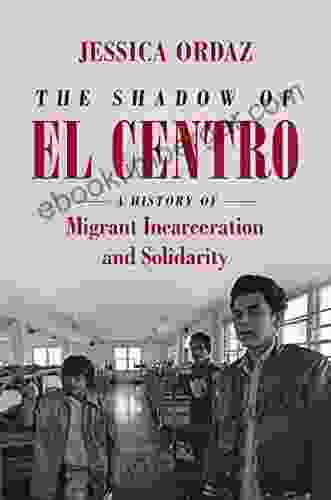History of Migrant Incarceration: Power, Politics, and Solidarity Justice

In the sprawling landscape of the United States, a hidden chapter of injustice unfolds: the mass incarceration of migrants. This article embarks on a historical journey through the labyrinthine history of migrant detention, shedding light on the systemic oppression, political machinations, and grassroots resistance that have shaped this ongoing humanitarian crisis.
5 out of 5
| Language | : | English |
| File size | : | 12169 KB |
| Text-to-Speech | : | Enabled |
| Screen Reader | : | Supported |
| Enhanced typesetting | : | Enabled |
| Word Wise | : | Enabled |
| Print length | : | 186 pages |
The Seeds of Migrant Incarceration
The roots of migrant detention can be traced back to the 19th century, when the United States established immigration policies aimed at restricting and controlling the flow of foreign workers. These policies often discriminated against non-white immigrants, particularly those from Latin America and Asia.
In the early 20th century, the U.S. Immigration and Naturalization Service (INS) was created, with its mandate expanding to include the deportation and detention of undocumented immigrants. The INS wielded broad powers, often targeting migrants for minor offenses or technical violations.
Escalation and Expansion: The Rise of Mass Incarceration
The 1986 Immigration Reform and Control Act marked a pivotal moment in the history of migrant incarceration. This legislation introduced harsh penalties for undocumented immigration, including increased bFree Download enforcement and expanded detention facilities.
The "War on Drugs" of the 1980s and 1990s also played a significant role in the mass incarceration of migrants. Disproportionately targeting minority communities, including Latinos and African Americans, these policies led to the criminalization of immigrants for drug-related offenses.
As bFree Download enforcement intensified, the number of migrants detained skyrocketed. By 2009, the United States had the largest immigration detention system in the world, with over 300 detention centers housing tens of thousands of people.
The Oppressive System: Power and Control
Migrant detention centers are often overcrowded, unsanitary, and rife with human rights violations. Detainees are subjected to prolonged periods of confinement, inadequate healthcare, and limited access to legal representation.
The power dynamics within detention centers are skewed, with guards and staff wielding excessive authority over detainees. This power imbalance creates a culture of fear and intimidation, eroding the basic rights and dignity of those detained.
The system of migrant incarceration serves as a tool of social control, reinforcing the divide between "citizens" and "non-citizens" and perpetuating fear and distrust.
The Erosion of Rights: A Humanitarian Crisis
The mass incarceration of migrants has devastating consequences for individuals, families, and communities. Prolonged detention takes a severe toll on both physical and mental health, leaving detainees with lasting trauma.
The separation of families is another cruel aspect of migrant detention. Children are torn from their parents and placed in foster care or group homes, enduring the emotional and psychological scars of separation.
Migrant detention has become a lucrative industry, with private prison companies profiting from the incarceration of vulnerable people. This profit motive has fueled the expansion of the detention system, prioritizing profit over human suffering.
Grassroots Resistance: Solidarity and Justice
In the face of oppression, grassroots movements have emerged to challenge the injustices of migrant detention. Led by immigrant rights organizations, faith-based groups, and social justice advocates, these movements have mobilized to provide support and solidarity to detained migrants.
Protests, hunger strikes, and legal challenges have been instrumental in raising awareness of the plight of detained migrants and demanding accountability from the government.
Solidarity justice is at the heart of these grassroots movements, recognizing the interconnectedness of all people and the responsibility to stand with those who are marginalized.
Transformative Justice: A Call for Action
The history of migrant incarceration in the United States is a complex and sobering tale of oppression, exploitation, and resistance. Breaking the cycle of mass detention requires a transformative approach that prioritizes human rights, dignity, and justice.
This transformation involves:
- Ending the criminalization of immigration and creating a path to citizenship for undocumented immigrants.
- Overhauling the immigration detention system to ensure humane treatment and due process protections.
- Providing comprehensive support for released detainees, including housing, healthcare, and legal assistance.
- Challenging the underlying racism, xenophobia, and nationalism that fuel anti-immigrant policies.
- Building bridges of solidarity across communities, recognizing the shared humanity of all people.
: A Journey of Hope and Resistance
The history of migrant incarceration is a reminder of the enduring struggle for justice and human rights. By understanding the oppressive systems at play and supporting grassroots movements for transformative change, we can create a more just and equitable future for all.
This journey is not without hope. The stories of resilience, solidarity, and resistance offer a beacon of light, guiding us towards a future where every person is treated with dignity and respect, regardless of where they were born or their immigration status.
Let us embark on this journey together, standing in solidarity with migrants and demanding a just and humane immigration system.
5 out of 5
| Language | : | English |
| File size | : | 12169 KB |
| Text-to-Speech | : | Enabled |
| Screen Reader | : | Supported |
| Enhanced typesetting | : | Enabled |
| Word Wise | : | Enabled |
| Print length | : | 186 pages |
Do you want to contribute by writing guest posts on this blog?
Please contact us and send us a resume of previous articles that you have written.
 Book
Book Novel
Novel Page
Page Chapter
Chapter Text
Text Story
Story Genre
Genre Reader
Reader Library
Library Paperback
Paperback E-book
E-book Magazine
Magazine Newspaper
Newspaper Paragraph
Paragraph Sentence
Sentence Bookmark
Bookmark Shelf
Shelf Glossary
Glossary Bibliography
Bibliography Foreword
Foreword Preface
Preface Synopsis
Synopsis Annotation
Annotation Footnote
Footnote Manuscript
Manuscript Scroll
Scroll Codex
Codex Tome
Tome Bestseller
Bestseller Classics
Classics Library card
Library card Narrative
Narrative Biography
Biography Autobiography
Autobiography Memoir
Memoir Reference
Reference Encyclopedia
Encyclopedia Kevin Mcelroy
Kevin Mcelroy Kenneth Paul Rosenberg
Kenneth Paul Rosenberg Keyshawn Johnson
Keyshawn Johnson Kerri Shields
Kerri Shields Kia Hamadani
Kia Hamadani Kevin Duncan
Kevin Duncan Kelly M Jolley
Kelly M Jolley Kindle Edition
Kindle Edition Kevin C Gardner
Kevin C Gardner Kim Heacox
Kim Heacox Kevin House
Kevin House Kevin Brown
Kevin Brown Kenny Harry
Kenny Harry Kerri Ryan
Kerri Ryan Kevin Lewis
Kevin Lewis Ken Jennings
Ken Jennings Kevin Boyle
Kevin Boyle Kim Zimmer
Kim Zimmer Kim Phillips Fein
Kim Phillips Fein Kevin Sites
Kevin Sites
Light bulbAdvertise smarter! Our strategic ad space ensures maximum exposure. Reserve your spot today!

 Stephen FosterUnveil the Secrets of a Distant Land: Dive into the Captivating Novel, Dark...
Stephen FosterUnveil the Secrets of a Distant Land: Dive into the Captivating Novel, Dark...
 Bradley DixonThe Ultimate Guide to Home Repairs: Empowering Homeowners with Confidence and...
Bradley DixonThe Ultimate Guide to Home Repairs: Empowering Homeowners with Confidence and... Felipe BlairFollow ·3.9k
Felipe BlairFollow ·3.9k John Dos PassosFollow ·12.9k
John Dos PassosFollow ·12.9k Seth HayesFollow ·16.2k
Seth HayesFollow ·16.2k Oliver FosterFollow ·11.4k
Oliver FosterFollow ·11.4k Fredrick CoxFollow ·15.6k
Fredrick CoxFollow ·15.6k Leon FosterFollow ·18.5k
Leon FosterFollow ·18.5k Gilbert CoxFollow ·2.3k
Gilbert CoxFollow ·2.3k Bryce FosterFollow ·5.5k
Bryce FosterFollow ·5.5k

 Chadwick Powell
Chadwick PowellDiscover the Secrets of Optimal Health with "The Healthy...
Preface: Embark on a Transformative...

 Andres Carter
Andres CarterUnveiling the Profound Journey of Womanhood: A Daughter's...
In the tapestry of...

 Travis Foster
Travis FosterWords to Live By: The Essential Guide to Finding...
Words have the power to shape our...

 Chinua Achebe
Chinua AchebeThe Ultimate Guide for Men to Recover from a Breakup
: Breakups are never...

 Spencer Powell
Spencer PowellNew Mindset, New Results: The Proven Path to Unleashing...
About the Book ...
5 out of 5
| Language | : | English |
| File size | : | 12169 KB |
| Text-to-Speech | : | Enabled |
| Screen Reader | : | Supported |
| Enhanced typesetting | : | Enabled |
| Word Wise | : | Enabled |
| Print length | : | 186 pages |










